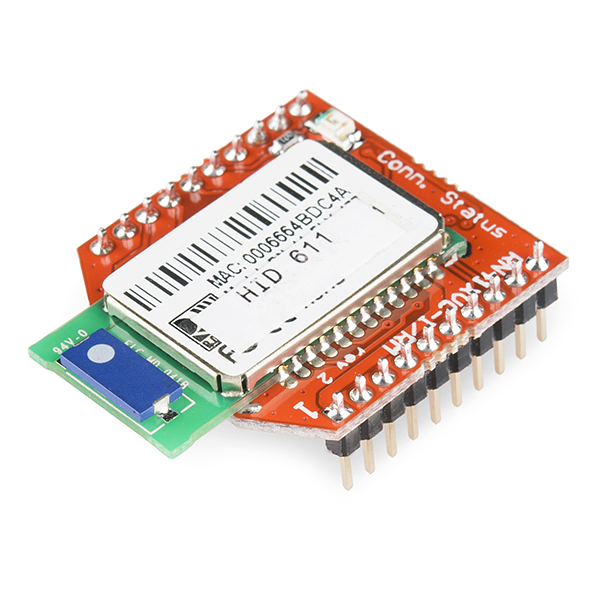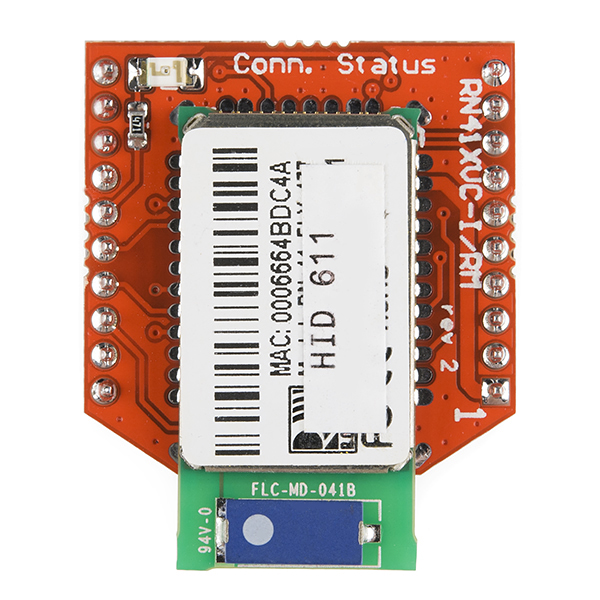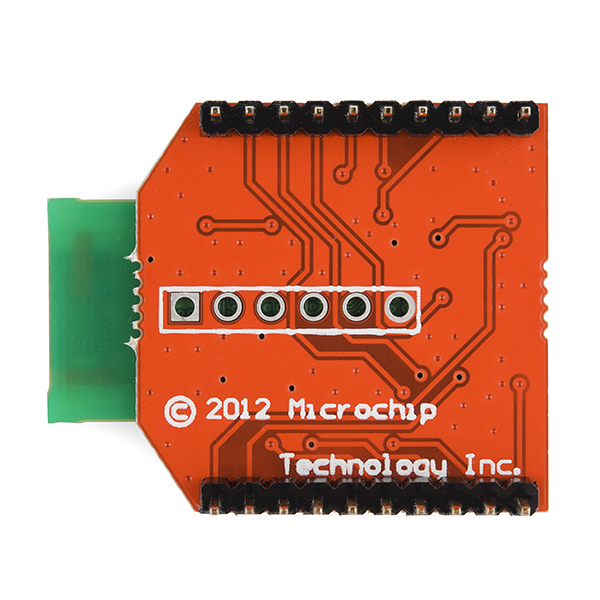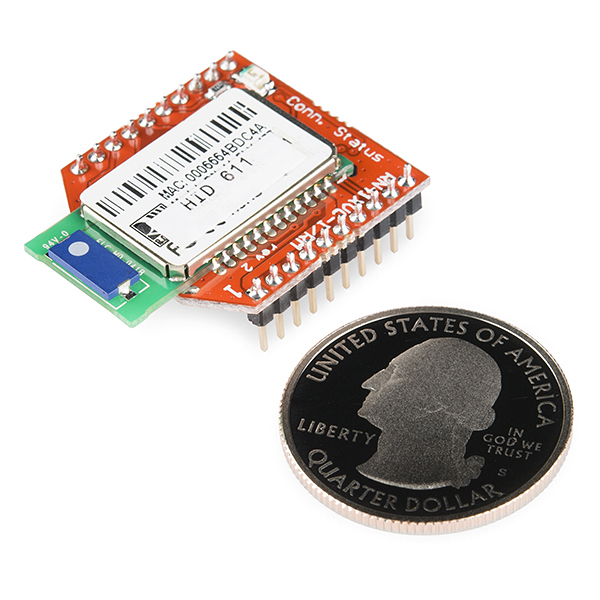RN41-XV Bluetooth Module - Chip Antenna
So it turns out that your XBee based device would work even better as a Bluetooth device... that probably means back to the drawing board, right? Well not anymore! Now you can swap in Bluetooth functionality without a major hardware redesign!
The RN41XV is a small form factor, low power Bluetooth radio module offering plug-in compatibility for the widely used 2 x 10 (2mm) socket typically used for 802.15.4 radio modules. Based on the popular 2 x 10 (2mm) socket footprint often found in embedded applications, the Roving Networks’ RN41XV module provides Bluetooth connectivity in legacy and existing designs that may have been based upon the 802.15.4 standard.
The RN41XV is built upon Roving’s RN41 low power Bluetooth module. The module has an embedded Bluetooth stack and supports multiple interface protocols and profiles including the commonly used SPP and HID profiles.
- Fully certified Bluetooth® version 2.1 module, supports version 2.1 + Enhanced Data Rate (EDR)
- Backwards-compatible with Bluetooth version 2.0, 1.2, and 1.1
- Pin compatible with widely used 2 x 10 (2mm) socket typically used for 802.15.4 applications
- Low power: 30 mA connected, < 10 mA sniff mode
- UART (SPP or HCI) and USB (HCI only) data connection interfaces
- Sustained SPP data rates: 240 Kbps (slave), 300 Kbps (master), 115.2 Kbps (factory default)
- HCI data rates: 1.5 Mbps sustained, 3.0 Mbps burst in HCI mode
- Embedded Bluetooth stack profiles included (requires no host stack): GAP, SDP, RFCOMM, and L2CAP protocols, with SPP, HID and DUN profile support
- Bluetooth SIG certified
- Chip antenna on-board
Comments
Looking for answers to technical questions?
We welcome your comments and suggestions below. However, if you are looking for solutions to technical questions please see our Technical Assistance page.
Customer Reviews
No reviews yet.





I currently have this and the Arduino FIO v3, could I just plug it in and proceed as usual? Are there any tutorials for setting this one up in general, or for setting up an xBee with the Fio?
Does not work with FIO V3 if you just plug it in. the CTS / RTS pins are swapped and there is not breakout for the CTS pin 16 on the FIO V3. What I did to get this to work is added a jumper on th RN-42 module between pins 12 and 16 this allowed the bluetooth module to send. Then every thing worked. I am working on a tutorial on setting this and the RN wifi module up. Will post when it is done.
Do i need to do this if I am using the version 1 of arduino fio because the bluetooth module is connecting but is hang every time i type something in the serial monitor
Yes, connection is handled by the module but sending via the serial need this link added see http://www.forward.com.au/pfod/ArduinoProgramming/FioV3/index.html for the details.
Hello!!
I have purchased 4 of this modules. I have been using in SPP mode. I have wrote a Delphi utility that catch the messages and redirect it to keyboard keystrokes. Now my question is: If this module identifies as HID mouse/Keyboard, in HID mode it will send the message as virtual keyboard..? I have tried setting in HID mode but nothing happen on the Pc as I send text.
Has someone something similar working.? I would like to get ride off the delphi listening utility. Any clues..?
I have same problem did you have any answers?
I have this working with a Lilypad and Lilypad xbee hosting the chip - but only if I use pin 0/1 (rx,tx) of the Lilypad - I have not been able to communicate with the rn41xv using the softwareserial library at any combination of baud rate or various pins. Has anyone out there been able to get this to work with softwareserial on the Lilypad? . . . btw, i have also managed to switch it to HID profile and can pair with my iDevices as a keyboard to log data or drive simple ios apps like magic monitor. IT WOULD BE VERY HELPFUL to be able to move it off the rx/tx pins to facilitate programming and debugging . . . .
I'm having the same issue. Let me know if you have an update (bert486@gmail.com). Thanks!
This may be a silly question, but why is this board half the price of the RN-41 board? It looks like it's based on the same RN41 radio module.
The BlueSMiRF modem (which I assume you're talking about) has logic and power level shifting built-in so it's compatible with anything from 3.3V to 6V (Arduino, single-cell li-po's, etc.). All this module does is break out most of the pins on the RN-41 with no frills, so if you're trying to get information from a sensors or ICs that aren't 3.3V, you've got to do some extra work.
EDIT: Actually, I just noticed the plain breakout. I have no idea why that is so much more expensive, it looks like the exact same product in a different PCB layout.
It will work with X-CTU. I use the terminal serial funtion to set up parameters for all my serial devices.
Does it work with arduino?
Anything works with Arduino if you put in the effort. A better question is, how easily does it work with an Arduino? The answer is since the Uno (assuming you're using it) has 5V logic and this uses 3.3V, you'll want to get one of Sparkfun's interface boards, like an XBee explorer.
:) you're right, my question was badly formulated.. i do have XBee explorer :) and what about configuration using the x-ctu? or is there another program? how can i do it?
X-CTU is a program designed by digi to download XBee firmware. Since this isn't an XBee the software is going to be pretty useless. But since all you need is the serial pins an XBee Explorer will connect it to your computer and then you can send it commands using your favorite serial terminal.
:) That I'm not sure about, but if it works for an XBee it should probably work with this